
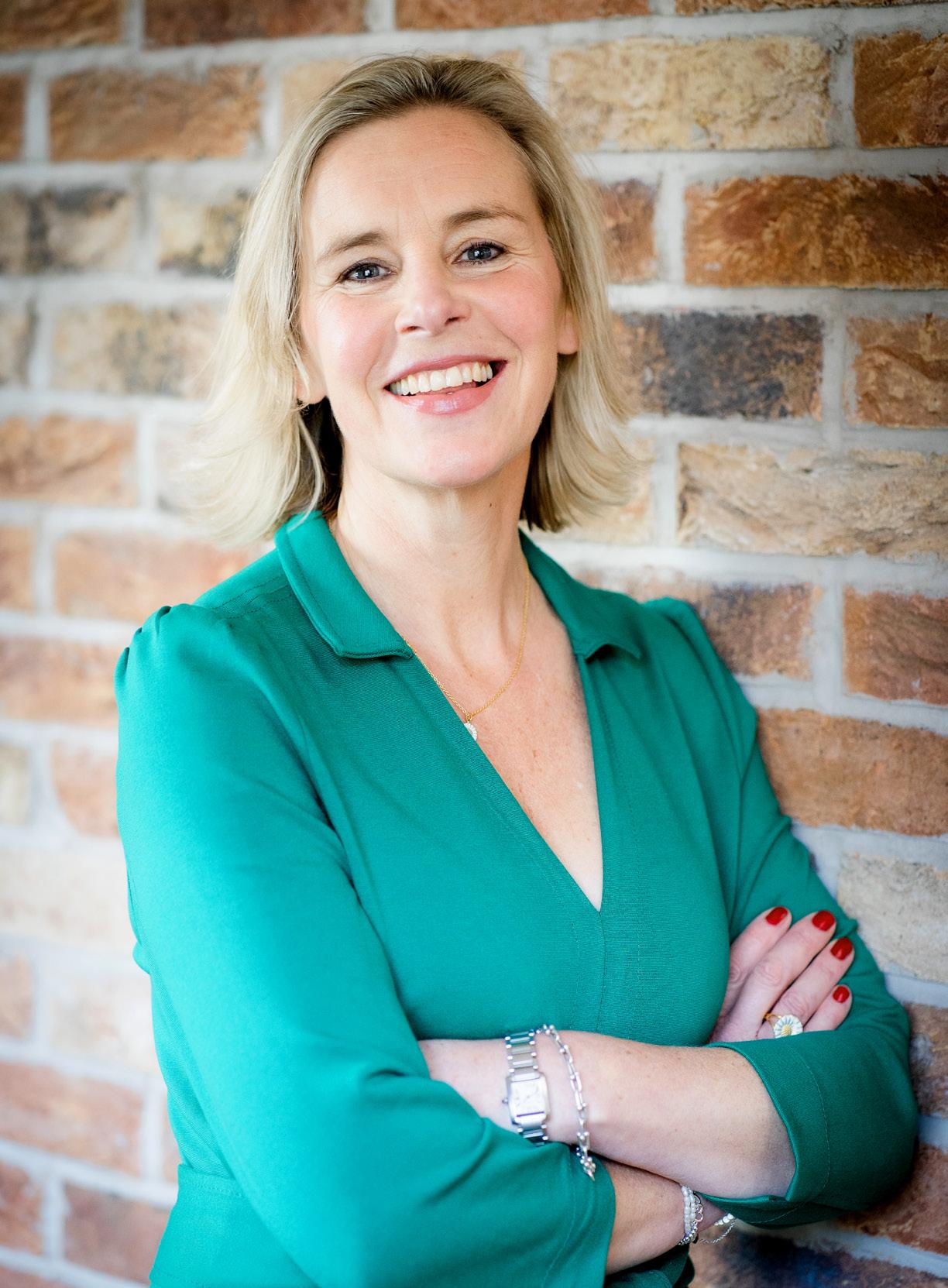



We are now in the second year of our five-year strategy , and the world around us continues to shift at pace. Global leadership changes, the retreat of major donors from multilateral commitments, increasing financial strain on critical institutions like the World Health Organization (WHO) , and the compounding effects of conflict, climate change, and economic instability have all deepened the complexity of the global health environment.
These challenges are real and pressing—but they are not entirely new. Our strategy anticipated many of these trends, allowing us to remain agile, grounded, and forwardlooking even as the context grows more demanding.
At this pivotal moment, clarity of purpose is essential. We must continue to invest in the long-term: in stronger health systems, in country-led solutions, and in reshaping the global response so that it is sustainable, equitable, and resilient. The current funding constraints are significant, and the threat to decades of progress cannot be understated. But this is also a critical opportunity—to reimagine partnerships, build resilience from the ground up, and shift resources and decision-making closer to the communities most affected by neglected tropical diseases (NTDs).
And still, there is much to celebrate. For the first time in our history, we have Co-Chairs of our Board of Trustees. We welcome Dr Camilla Ducker from the UK and Professor Samba Sow from Mali. We have seen increases in treatment delivery, the securing of new funding streams, and the expansion of our research collaborations. These are not just metrics of success, they are the result of tireless work by our team,
our partners, and the communities who make this mission possible.
Looking forward, we are consolidating our country focus, embedding robust multi-year planning frameworks grounded in clear theories of change, ensuring transparency and impact. We are driving forward priorities such as strengthening health systems, domestic resource mobilisation (DRM), and more integrated, One Health-based approaches. These are more than strategic shifts, they reflect our commitment to long-term, country-owned progress.
I am grateful for the trust placed in our team during these challenging times, and proud of what we are building together. With humility, resilience, and shared purpose, I look forward to the work ahead— and to the future we are helping to shape.
Dr Wendy Harrison Chief Executive Officer
30 million treatments against schistosomiasis (SCH), soil-transmitted helminthiasis (STH) and lymphatic filariasis (LF)

21.3 million people reached
ALB Albendazole
CD W(s) Community data workbook(s)
CES Coverage evaluation surveys
DRM Domestic resource mobilisation
ESPEN Expanded Special Project for Elimination of Neglected Tropical Diseases
FGS Female genital schistosomiasis
FIG FGS Integration Group
GAT Gap Assessment Tool
CHD/CHDs Child Health Day/Days
LF Lymphatic filariasis
MAP Multi-Country Assessment of Prevalence for Female Genital Schistosomiasis (MAP-FGS)
MDA Mass drug administration
MoH Ministry/ies of Health

SCHOOL-AGED CHILDREN (5-14 YEARS)
ADULTS AND ADOLESCENTS (≥15 YEARS) SCH
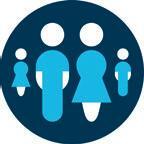

M ORBID Morbidity Operational Research for Bilharziasis Implementation Decisions
NNN Neglected Tropical Disease NGO Network
NTDs Neglected tropical diseases
PPC Pediatric Praziquantel Consortium
PSAC Preschool-aged children
PZQ Praziquantel
SAC School-aged children
SCH Schistosomiasis
STH Soil-transmitted helminthiasis
WASH Water, sanitation and hygiene
WHO World Health Organization
WOAH World Organisation for Animal Health


Supporting
In line with our strategy, we have used our technical expertise to support our ministry of health (MoH) and implementation partners across six countries to reach over 21 million people with over 30 million treatments for SCH, STH and LF.


Ethiopia
Côte d’Ivoire
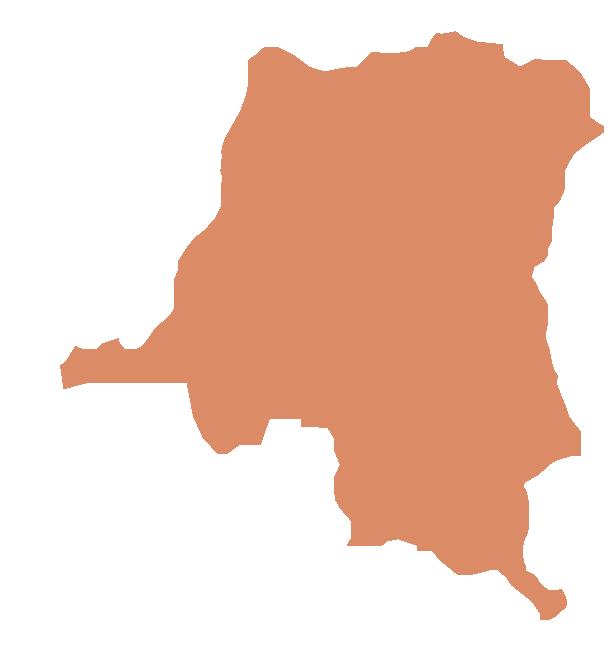
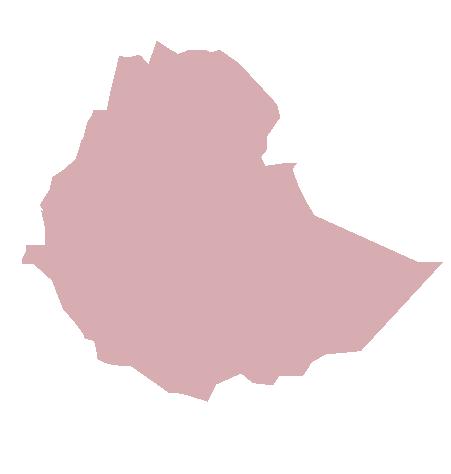




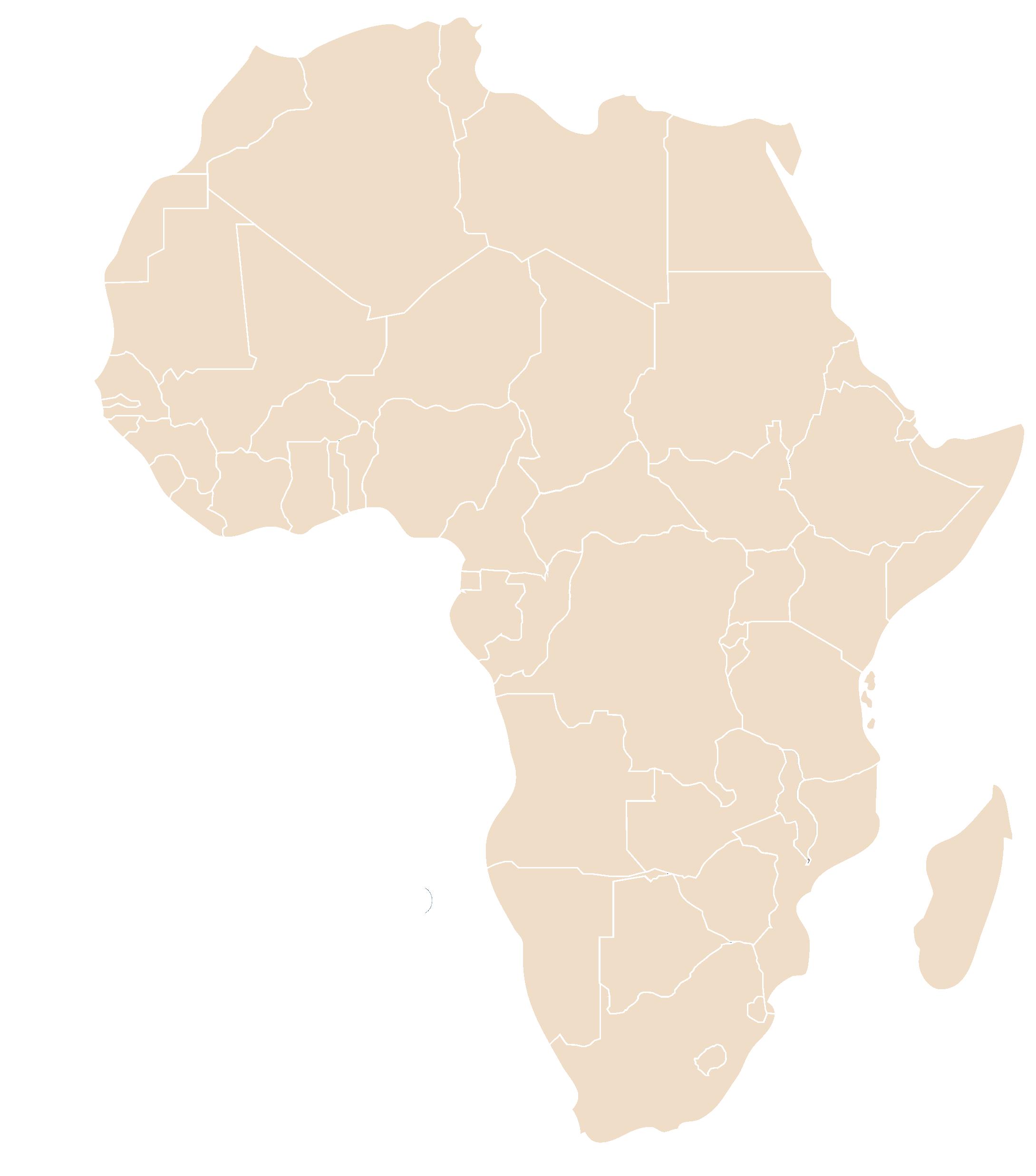
Democratic Republic of the Congo (DRC)
Coverage evaluation surveys (CES)
Impact assessments
Soil-transmitted
1,473,757
Lymphatic filariasis 1,317,698
TOTAL 4,166,465
Madagascar



This year, a significant milestone was achieved through our shared leadership role in the Pediatric Praziquantel Consortium (PPC) . For the first time globally, a new pediatric treatment for SCH was delivered to pre-school aged children (PSAC) in Uganda and Côte d’Ivoire. These countries started delivering treatment to PSAC as part of initial small-scale pilots which also aimed to test delivery within existing platforms. A total of 9,854 preschoolers aged three months to six years, received treatment in both countries.
The project is co-funded by EDCTP and GHIT and is jointly led by Unlimit Health alongside the Swiss Tropical and Public Health Institute as cochairs of the ADOPT team of the PPC. Leading up to delivery, we worked closely with the governments of Côte d’Ivoire, Kenya and Uganda to finalise their strategies and tools, and implement these to increase awareness, acceptance and uptake of the new treatment.
Baluka Robbinah is a health worker in Uganda involved in the delivery of a newly developed pediatric treatment for SCH. Here she is giving the dispersible tablet to threeyear old, Wawulya. This treatment is specifically for children aged three months to six years. As part of the PPC we have been supporting work to develop, register, and provide access to this new pediatric treatment. This is an important contribution to the elimination of SCH as a public health problem.


September 2024 marked a historic moment in Zanzibar, where the 12 billionth dose of albendazole (ALB), an essential treatment for LF and intestinal worms donated by GSK , was delivered during a ceremony attended by Her Royal Highness (HRH) the Duchess of Edinburgh. The event highlighted Unlimit Health’s enduring partnership with Zanzibar’s MoH, which contributed to reducing SCH prevalence from 50% to under 2%. This achievement underscores the transformative potential of long-term collaboration and local leadership in tackling NTDs.
the Duchess of Edinburgh listens to a community member who received treatment alongside a community drug distributor during her visit to a MoH/Unlimit Health supported mass drug administration (MDA) in Zanzibar.
Health
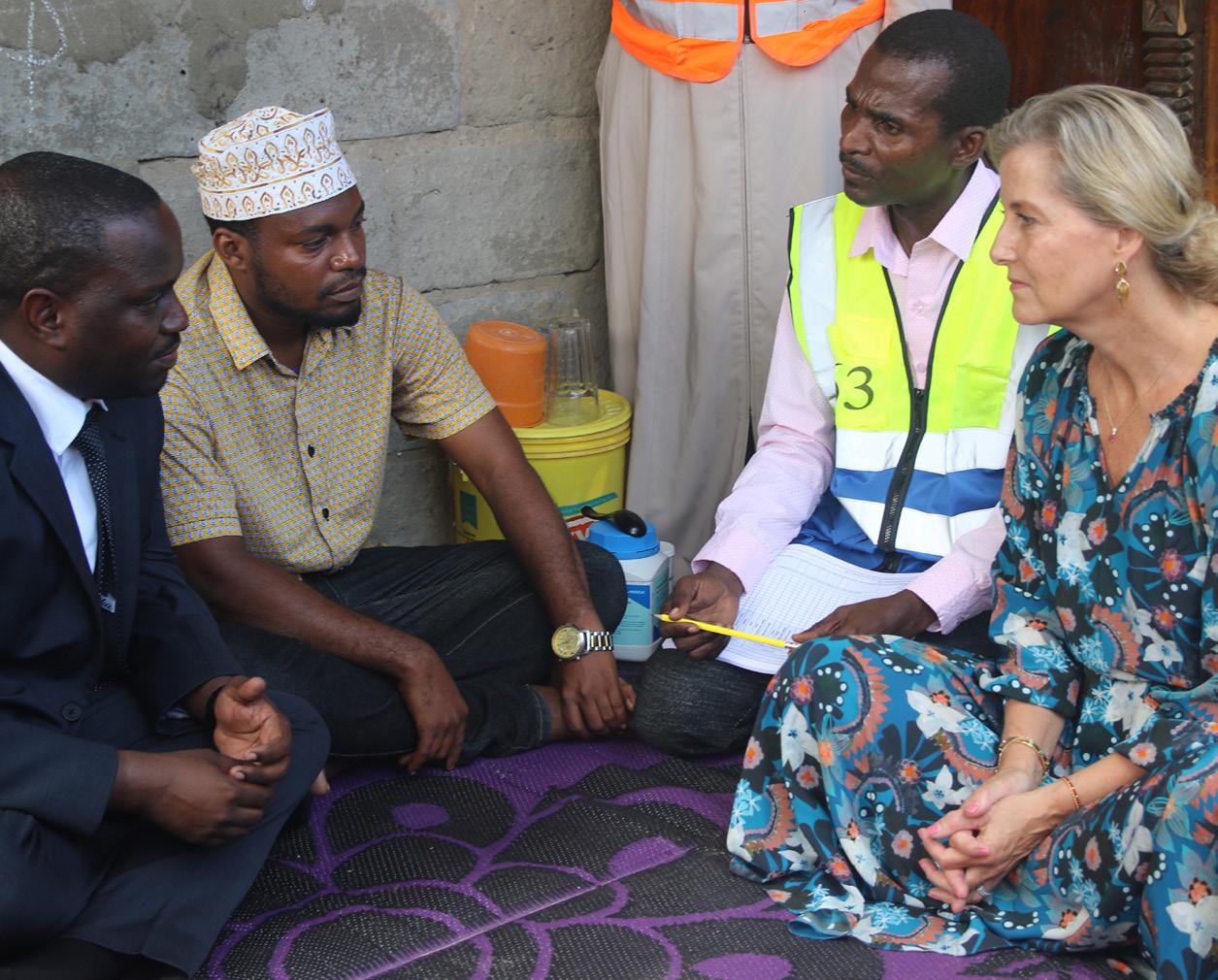

Left to right- Honorable Nassor Ahmed Mazrui, Minister of Health Zanzibar, HRH the Duchess of Edinburgh, Dr Shaali Ame, Programme Manager for NTDs, MoH Zanzibar, Dr Wendy Harrison, CEO, Unlimit Health, Dr Lynsey Blair, Technical Director, Unlimit Health and Dr Fatma Kabole, Deputy Director of Preventative Services and Health Promotion, MoH Zanzibar, in Mzambarauni village where the 12th billionth treatment of ALB was delivered during the visit of HRH to the country in 2024.
Health



Typically, treatment for parasitic diseases happens through MDA campaigns independently from other healthcare activities like vaccination or delivery of Vitamin A. In response to evolving strategic priorities and adjustments in funding allocations for global health initiatives, including those targeting NTDs, we are implementing pilot approaches to enhance the sustainability of treatment delivery.
In November 2024, the MoH in Uganda incorporated the delivery of praziquantel (PZQ) into their Child Health Days (CHDs) * . The CHDs presented an optimal opportunity to expand PZQ administration. With support from Merck Healthcare KGaA , The END Fund , and The Gates Foundation , we undertook a comprehensive evaluation of this approach, which included direct supervision of treatment delivery, process and policy assessments, and a CES.
* Child Health Days are biannual campaigns that bolster routine primary healthcare services by extending Vitamin A supplementation, deworming, immunisation, and growth monitoring in communities.
Data collection, analysis and reporting of these monitoring and evaluation activities is complete. Our assessment of the integrated campaign was broadly positive with delivery taking place in all planned districts, using medicines that would otherwise have expired. Whilst there was high programme reach and coverage for PZQ, a number of key learnings have been identified, including – the need for early planning, the updating of guidelines to include PZQ integration, investment in training activities, strengthened community sensitisation and mobilisation, reduced pressures on existing resources, and ensuring that backup systems are in place for supply challenges. While initial support from the MoH and district stakeholders was encouraging, sustained engagement from funders and partners will be essential to advance this strategy in the near future.
The results provide important lessons for future integrated models in Uganda and elsewhere, especially when resources are constrained.
Jovia is two and a half years old. She is one of the PSAC to receive a newly developed pediatric treatment option for SCH in Bugiri District in Uganda. Access to treatment for PSAC is crucial in the efforts towards elimination of SCH.


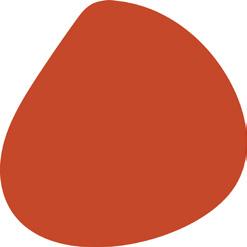
In alignment with the 2030 roadmap for NTDs, rigorous measurement of programmatic impact and reach is fundamental to tracking progress toward disease elimination. To support this goal, we have engaged closely with MoH and research partners to carry out treatment impact assessments and CES across seven countries.
These efforts are designed to generate high-quality data to inform programme performance and guide future treatment strategies. Insights from these monitoring and evaluation activities underpin the refinement of targeted treatment approaches, ensuring that treatment is delivered with optimal efficiency and effectiveness—a cornerstone in achieving elimination targets.

Mtumweni Ali works with our partner, the MoH, as a field worker and lab technician in Zanzibar. He collects freshwater snails that may carry the schistosome parasite, examines them under a microscope to detect infection, and alerts nearby communities if their local water sources pose a risk.


In FY24/25, we continued to support national partners in enhancing the quality and performance of treatment programmes through robust data collection and evaluation efforts. We collaborated with MoH to conduct CES* in Côte d’Ivoire, Uganda and Zanzibar. The CES play a vital role in verifying reported treatment coverage and identifying gaps in access and uptake of medicines, ultimately informing improvements to programme implementation.
Early findings from Uganda and Zanzibar indicate high coverage for PZQ and ALB among school-aged children (SAC) and adults during MDA campaigns targeting SCH and STH. These preliminary results are expected to guide treatment planning and decision-making in FY25/26.
In Uganda, the CES also contributed to a broader programme evaluation examining the efficacy of delivering PZQ. This initiative assessed the viability of incorporating PZQ into the child health days to extend treatment reach among both PSAC and SAC.
* The CES are population based surveys that use representative sampling to estimate the proportion of individuals in the target population who received and consumed medications during MDA campaigns.
Additionally, we conducted four epidemiological, model-based geostatistical impact assessments with MoH partners in Zanzibar, the Democratic Republic of Congo (Part 2), Ethiopia (Part 3b), and Madagascar (Part 3). Using this innovative geostatistical approach ensures decision-makers, such as the MoH, have precise data on infection in communities. Subsequently the MoH can allocate the resources they have for deworming with more efficiency and ensure that over and or undertreatment through mass drug administrations (MDA) is minimised whilst adhering to global WHO guidance.
Interpretation and dissemination of results were conducted with initial virtual meetings, culminating in five country workshops which took place in Ethiopia, Côte d’Ivoire, DRC, Madagascar and Zanzibar. We supported a two-day in-person workshop with the MoH in Madagascar, bringing together representatives from across the NTD programme – at both central and district level – as well as those from the education, water, sanitation and hygiene (WASH), research and environmental sectors. The workshops aimed to review and reflect on the results of the impact assessment, assess the feasibility of operational approaches for more granular MDA distribution, and explore the potential for cross-sector strategies to strengthen SCH and STH elimination efforts.
Data generated by these surveys have been instrumental in supporting MoH decision-making on optimising the delivery of treatments and other interventions and in demonstrating impact goals aligned to the roadmap and the WHO Guideline for Schistosomiasis and to the WHO M&E Framework for Schistosomiasis and Soil-Transmitted Helminthiasis .
Following impact assessments, we have supported partners to share historical and current data in the required formats for WHO platforms for reporting and open access WHO Global Observatory and the Expanded Special Project for Elimination of NTDs (ESPEN) Portal . This has helped strengthen collaboration with ESPEN including on the improvement of planning tools such as the Community Data Tool. In July 2024, we coled a WHO meeting - Strategic Enhancements in Schistosomiasis Control: Leveraging Geostatistics and WHO Community Tool for Precision Mapping and Effective Control - to explore how geostatistics and the tool can enhance precision assessments and better target resources for SCH control.

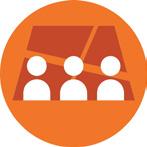
CIV: data not yet available
DRC:
83 districts

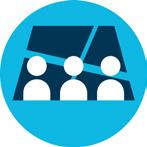



In July 2024, the Schistosomiasis Oversampling Study convened its final Technical Advisory Group meeting to assess the Schistosomiasis Practical and Precision Assessment (SPPA) pilot implementations in Kenya, Ghana, Liberia, Malawi, and Guinea. The meeting established final sample size parameters and endorsed the inclusion of additional components to monitor STH and Taenia solium within these impact assessments.
The SPPA protocol offers a strategic framework to enhance the efficiency and effectiveness of survey planning and MDA activities. Its application supports more precise targeting, improved data quality, and better-informed programme decisions.
To support broad adoption, the final SPPA manual and training materials have been made available in English, French, and Portuguese via the WHO AFRO ESPEN platform . In parallel, a web-based decision-support tool is under development in collaboration with ESPEN and Crosscut, aimed at guiding national programme managers through SPPA planning prior to survey implementation and data analysis post-survey. We continue to provide strategic input as part of the SPPA Strategic Advisory Group.
We were successful in securing funding from the Gates Foundation for the development of a Subnational Strategy and Action Plan for Schistosomiasis (SNAPS) and STH.
The SNAPS project is a strategic initiative designed to enhance subnational monitoring, evaluation, and interventions across endemic regions in subSaharan Africa. Recognising SCH and STH as major public health challenges disproportionately impacting vulnerable populations, this project aims to consolidate and leverage existing evidence to address knowledge gaps, develop actionable normative guidance aligned to that of the WHO which will enable targeted interventions.
We successfully implemented the WHO Gap Assessment Tool (GAT), in collaboration with the WHO Department of Control of NTDs and the Task Force for Global Health. This strategic assessment measured programmatic progress toward roadmap targets and provided both disease-specific and cross-cutting recommendations to address persistent challenges in the delivery and impact of NTD programmes.
The GAT process involved qualitative consultations with disease experts, national programme managers, and WHO officials, focusing on five key dimensions: diagnostics, monitoring and evaluation, advocacy and funding, access, and logistics. These insights spanned all NTDs and disease groups included in the WHO roadmap.
Findings from the GAT will be published in the upcoming WHO Global Report on NTDs 2025. In addition, a peer-reviewed article detailing the methodology has been accepted by PLOS Neglected Tropical Diseases and is expected to be released later this year.
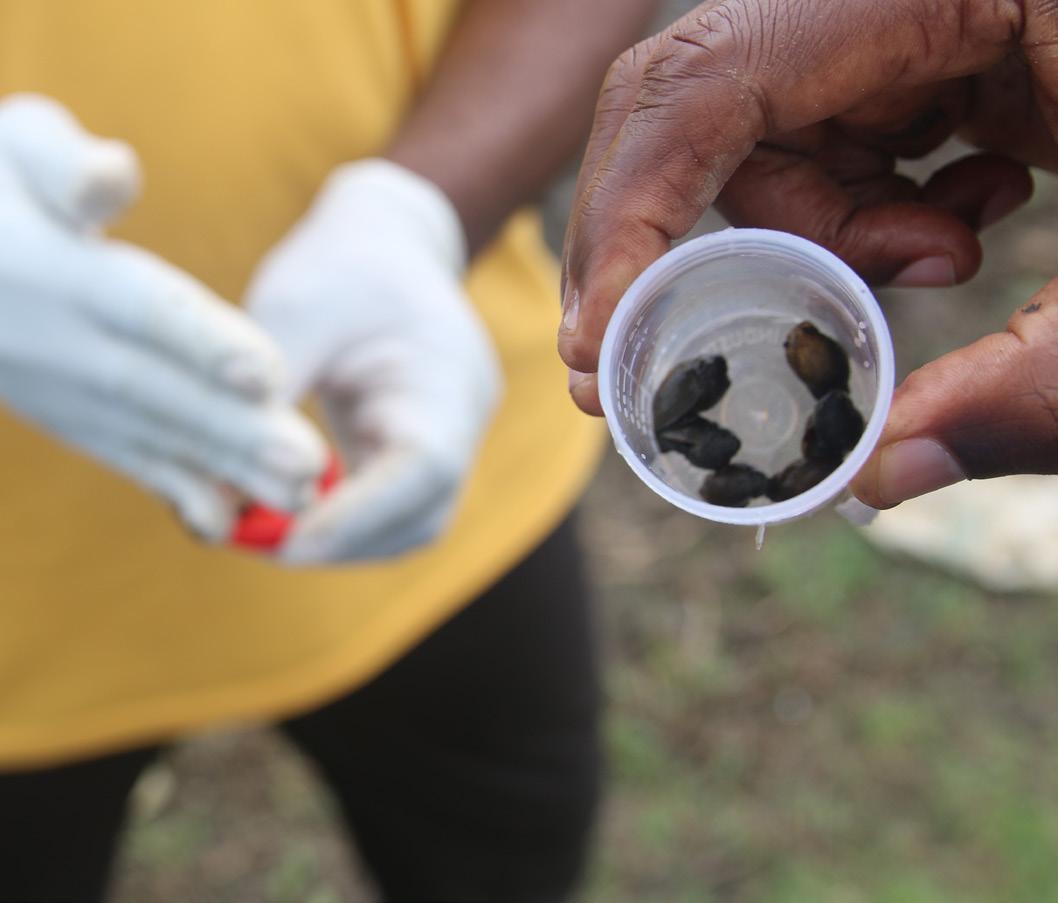
Mtumweni Ali works with the NTDs programme for the MoH in Zanzibar as a field worker and lab technician. Here, he is collecting snails at a site known to contain snails that harbour the schistosoma parasite. He collects the snails and tests them to see if they are infected by looking at them under the microscope.
Image by: Paula Plaza/Unlimit Health


We continue to contribute to the strengthening of the global evidence base on the burden of FGS through our participation in The Gates Foundationfunded Multi-Country Assessment of Prevalence for FGS (MAP-FGS) study .
As part of this initiative, which is led by the Coalition for Operational Research on NTDs, we have supported the development of training materials and tools to increase the capacity of country teams.
The MAP-FGS training manual and associated tools have been completed and are now actively used in training sessions. These resources —available in both French and English—provide comprehensive guidance on study methodology and clearly outline the roles and responsibilities of participating country teams, thereby enhancing implementation quality and consistency.
In August 2024, The Guardian featured FGS in a high-profile article following advocacy efforts at AIDS 2024 conference. The coverage underscored the urgent need to address this neglected gynaecological condition, which affects an estimated 56 million women and girls—primarily in sub-Saharan Africa.
The article highlighted the work of the FGS Integration Group (FIG) , a global coalition working to galvanise joint action on FGS across the sexual and reproductive health and rights, HIV, HPV/ cervical cancer, NTDs and WASH sectors. It also recognised our collaborative efforts with partners to elevate FGS on the global health agenda and ensure it receives the attention and resources necessary to reduce its burden.

We have also contributed to increased awareness and prioritisation of FGS within the SCH, NTDs and broader global health community. To this end, we have continued to co-chair FIG alongside Frontline AIDS . With FIG partners and WHO, we organised a high-level side event at the International AIDS Conference in Munich, July 2024 , convening endemic countries, UN agencies and funders to discuss policy and funding needs for integrating FGS into health services.
We also participated in a roundtable meeting organised by the Federal Government of Germany on FGS, chaired by WHO, alongside the World Health Summit in Berlin, October 2024 and continuously engaged with WHO for the development of global guidance on FGS. Additionally, we contributed to the production of several advocacy, policy and communications materials, including a policy brief and FAQ document .
Members of FIG, including Unlimit Health staff alongside WHO and endemic country representatives at a side event meeting at the International AIDS Conference in Munich, in July 2024. Convening endemic countries, UN agencies and funders to discuss policy and funding needs for integrating FGS into health services.
Image by: Unlimit Health

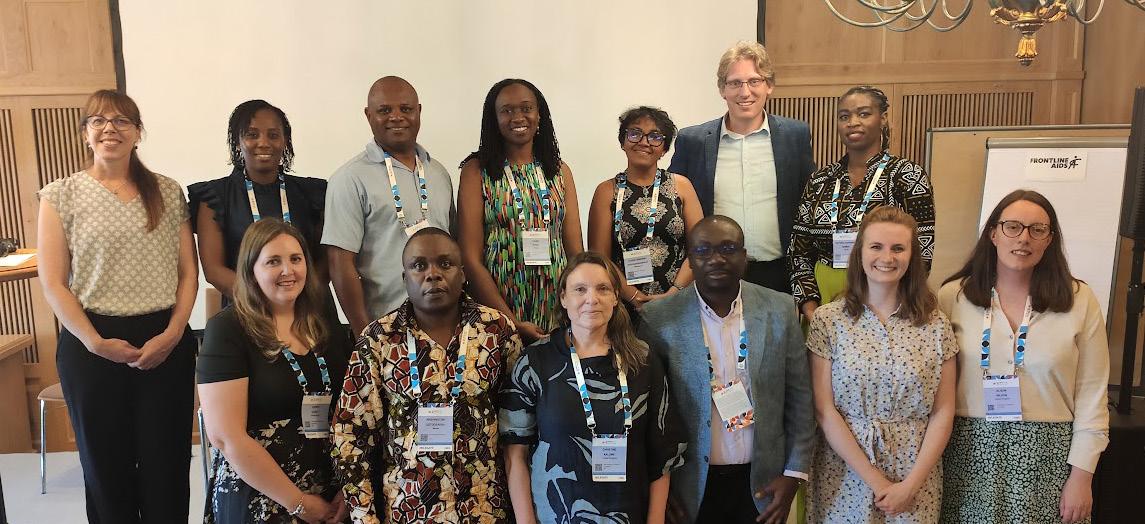


WASH are critical for the elimination of parasitic diseases. This year, we provided thought leadership and programmatic innovation on the role of WASH in the control and elimination of SCH and STH, by working through a WHO-convened process of evidence reviews and leading the development of programme and research practices.
In Uganda, implementation of a project to deliver environmental and behavioural improvements for the prevention of SCH has begun, through community-led action plans on WASH for reducing the risk of SCH transmission in three communities. Preparation for installation of an improved water supply system has started, using innovative and locally appropriate technology. The technology, a gravity-diverted membrane filtration system (GDM), will draw water from the Nile river, offering a reliable, high-yielding and safe supply, aiming to reduce community contact with contaminated surface water.
Through engagement with the Neglected Tropical Disease NGO Network (NNN) WASH Working Group, we continued to collaborate with the WHO NTD and WASH teams on the establishment of a new case study series published on the WHO website, “Impact in Action” , to enable crosscountry learning and encourage a broader cross sector collaboration movement across the NTD community. We also developed a monitoring framework for the Global Strategy on WASH and NTDs , and began data collection for reporting to improve accountability and action on WASH for the control and elimination of NTDs ahead of the midterm point of the NTD road map.
Finally, we contributed to the development of a NNN guide to social behaviour change communication for NTDs published in September 2024.


In collaboration with a consortium of international research institutions, we have been awarded £2.13 million by the UK Medical Research Council Applied Global Health Board to lead a research initiative targeting Taenia solium, an NTD, in Northern Uganda. This region experiences elevated transmission risks due to free-roaming pig farming practices, limited access to healthcare, and poor sanitation infrastructure.
T.solium infection can lead to neurocysticercosis in humans, a significant contributor to preventable epilepsy, with a disproportionate burden on marginalised communities. It is controlled in people using PZQ, the same treatment used against SCH. This research project aims to evaluate the effectiveness of integrated intervention strategies targeting both human and animal hosts.
A cluster randomised controlled trial will compare MDA of PZQ in human populations with and without the addition of pig anthelmintic treatment using oxfendazole. Transmission modelling and economic analysis will assess the cost-effectiveness and sustainability of this combined approach. Taking a One Health approach, looking across all the interconnected elements of a public health programme, will help develop more efficient, effective and sustainable solutions to NTDs in Uganda long-term.

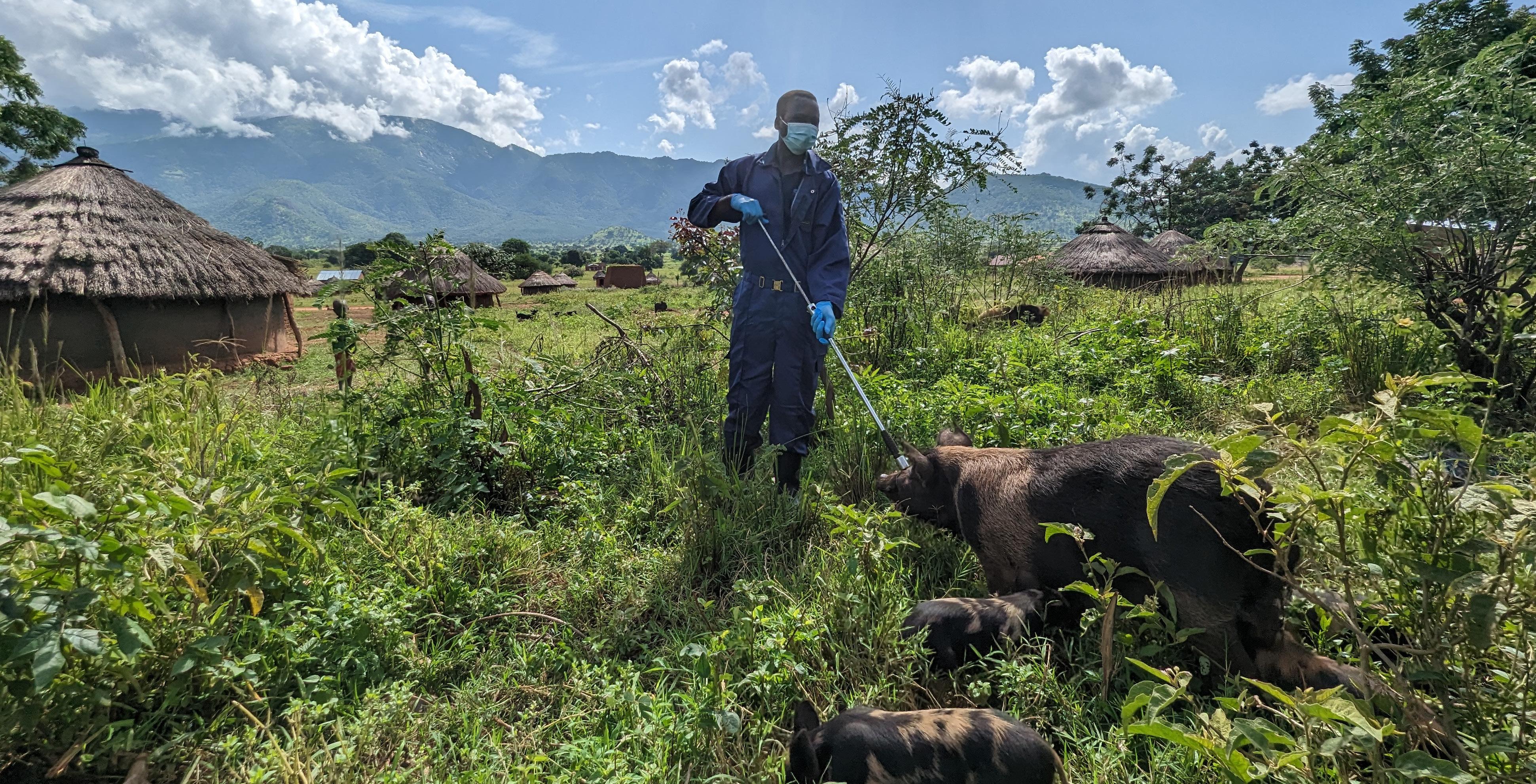

After three years of international negotiations, the world’s first Pandemic Agreement was finalised at the World Health Assembly. We have worked directly with UK government and civil society networks including Action for Global Health and Action for Animal Health to ensure that a One Health approach was included in the articles of the Agreement. This included chairing a roundtable with UK Government on One Health, Anti-Microbial Resistance and Climate Change in collaboration with Médecins Sans Frontières . Inclusion of One Health in the final wording was an important milestone to formally recognise the need to work across sectors and species to ensure any infectious disease outbreaks can be detected and controlled before we have another pandemic in people. The communities that Unlimit Health works with face multiple health challenges and often live in close contact with livestock or wildlife, making them vulnerable to new infectious diseases. Taking a One Health approach to support holistic community health, through nutrition, for example, can help improve community resilience overall.
We were part of the Expert Advisory Group for a tool to assess health workforce across sectors as part of the Tripartite Zoonoses Guidance . This UN tool is for use by governments to aid assessment of the key functions of their human, animal and environmental health sectors and what workforce competency and capacity exists to deliver them.
This year, we served as expert adviser on the World Organisation for Animal Health (WOAH) curriculum for animal health professionals – helping to shape the competency list was recommended as necessary for those working in animal health to work across sectors with a One Health approach.
We presented at the World One Health Congress 2024 as part of a multidisciplinary UN Quadripartite coalition on One Health’s panel (with WHO, WOAH, Food and Agriculture Organisation of the UN and UN Environment Programme).

This man-made dam in Hadiya Zone in Ethiopia captures water from the previous rainy season which the local community uses for swimming and household chores, as well as to provide drinking water for their cattle. The pond is also home to freshwater snails that host SCH. The interaction with humans and animals demonstrates the need for a One Health approach to tackling parasitic diseases.
Image by: Unlimit Health/ Indrias G. Kassaye


On 30th January 2025, to commemorate World NTDs Day, we launched the inspiring Send a Wish poster competition in partnership with The Leprosy Mission . The initiative mobilised young people across the UK to creatively raise awareness of NTDs and the communities affected by them. The winning and selected entries, shown on the right, were prominently showcased within the UK Parliament during an event hosted by the UK Coalition Against NTDs. This high-profile gathering united individuals with lived experience of NTDs, Members of Parliament, researchers, and advocates. Together, they underscored the urgent need for renewed UK leadership and commitment to eliminating NTDs.
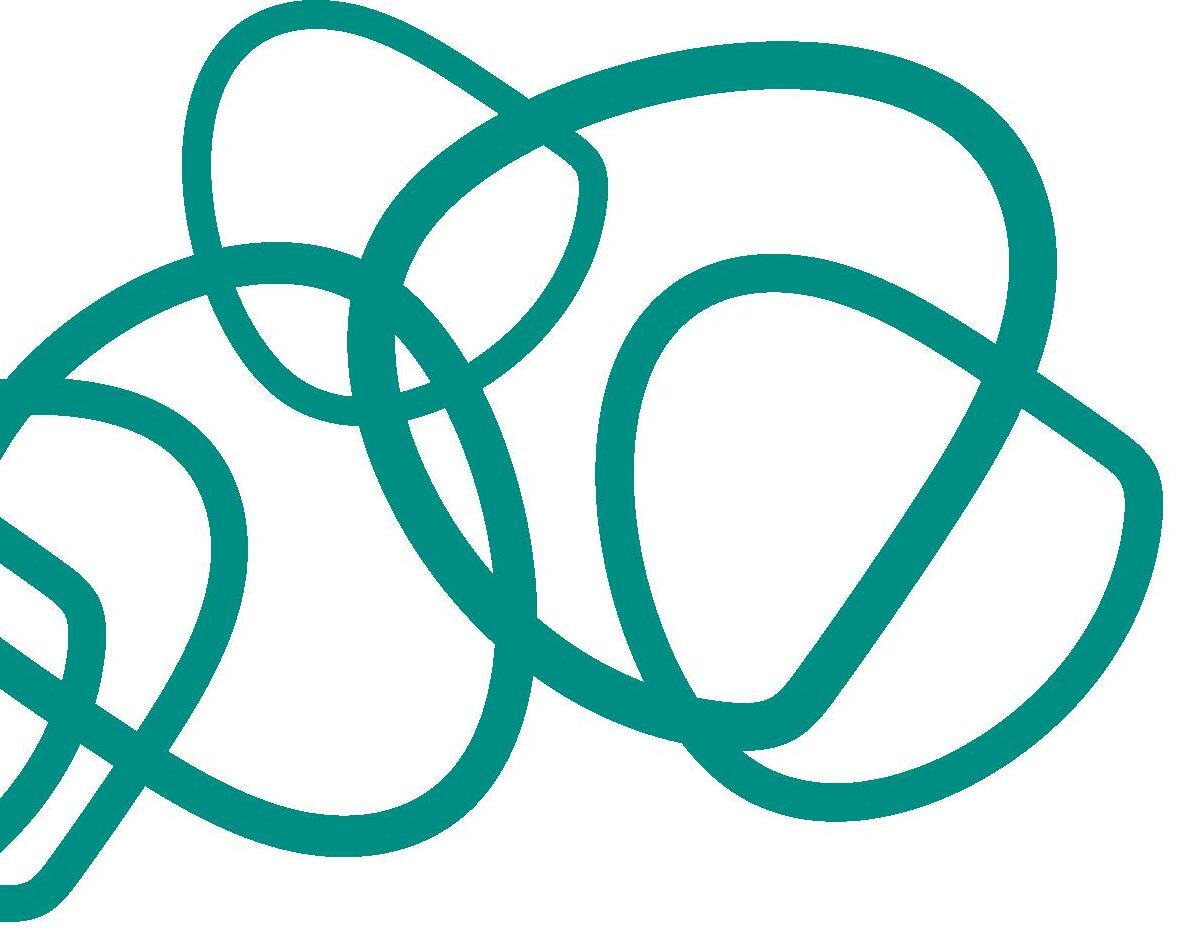

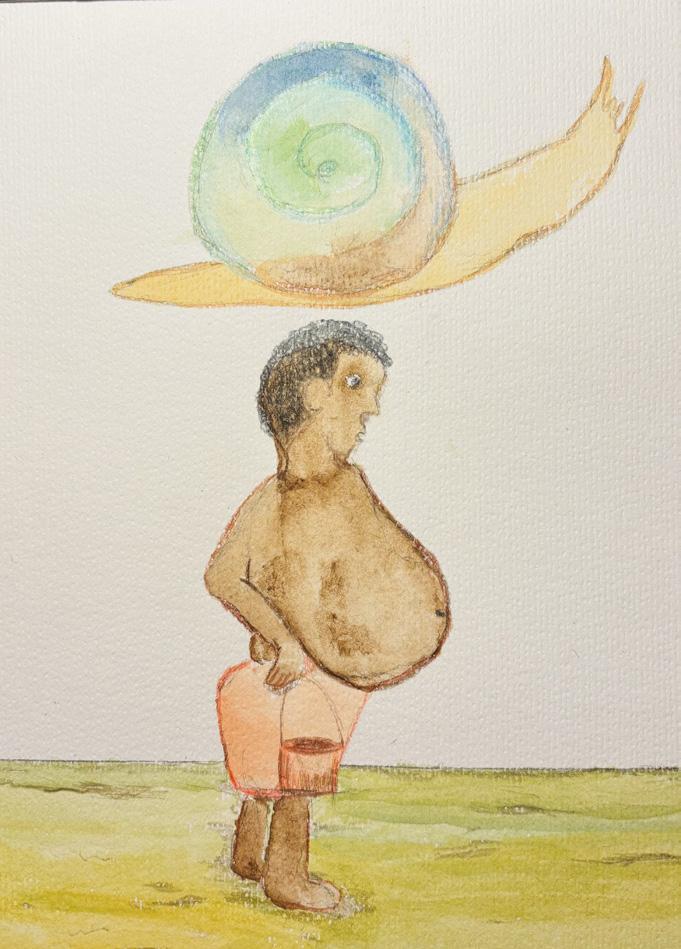
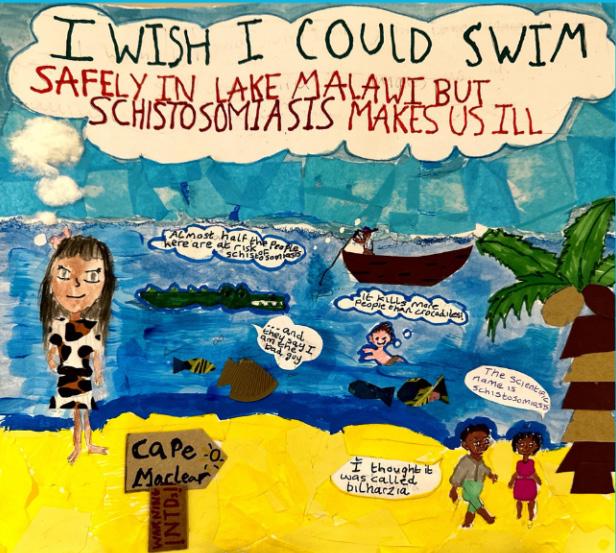


Our strategy is underpinned by the WHO roadmap and one of its pillars is to support country ownership. To this end we have worked to support countryled efforts for DRM, through the development of tools for data gathering and analysis, stakeholder engagement, and document review.
We also supported participation of NTD programme managers in international meetings, including the NNN conference in Kuala Lumpur, September 2024, the American Society of Tropical Medicine and Hygiene annual meeting in New Orleans, November 2024, and the International Conference on NTD Research in Africa in Kigali, January 2025.
With the new strategy, Unlimit Health has opened the scope of support for other parasitic diseases. It is now easier for the programme to work with this kind of support. The country has already taken some ownership of the programme because we are involved in activities from the very beginning, including the development of proposals and planning.
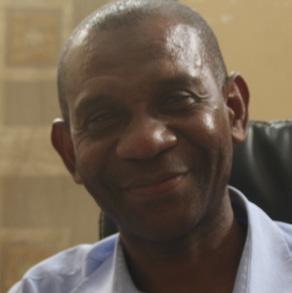
Over the past year, our communications team advanced ethical storytelling through strategic partnerships and participatory dialogue at major global health convenings.
At the NNN Conference in Kuala Lumpur, we cofacilitated a workshop addressing the consequences of distorted narratives and emphasising the power of community-led storytelling.
This commitment continued at the Africa Health Agenda International Conference in Kigali, where we co-hosted a dynamic side event with DNDi , The END Fund, Amref Health Africa , and the NNN . The session spotlighted visual artist and collaborator Nuits Balnéaires, who illustrated how artistic expression can disrupt harmful narratives and amplify marginalised voices—an approach that has informed our awareness-raising initiatives on FGS in Côte d’Ivoire.


Funding for mass treatment campaigns for parasitic worm disease remains essential. Treatment relieves the painful symptoms of parasitic disease and minimises the long-term damage it inflicts on people’s educations and livelihoods. Continued mass treatment is also crucial in addressing the root causes of parasitic disease. Eventual elimination cannot be achieved if infection rates are not reduced and kept low by treatment.
And it is thanks to thousands of individual supporters from all over the world, and to our funder organisations such as GiveWell , Effective Altruism Australia , Giving What We Can , Founders Pledge and The Life You Can Save , that we have been able to support 30 million treatments for parasitic disease this year. But in a challenging climate for global health financing, funding for mass treatment will be increasingly hard to find. That is why it is urgent that we can also fund the complementary initiatives required to achieve elimination before funding for mass treatment disappears and infection levels are allowed to creep back up. We’re delighted to say, individual donors and funding organisations have been enormously generous in funding these activities this year.

Here are some highlights:
For essential deworming to take place sustainably, treatment must be targeted on those who need it. Model-based geostatistical impact assessments enable this targeting to happen and so make possible the eventual elimination of parasitic worm disease.
Our Worms Can’t Run campaign saw hundreds of individual donors from across the globe raise almost £200,000 to fund Malawi’s adoption of geo-statistical impact assessments, so that treatment can be targeted on those that need it most. Such a huge success would not have been possible, in particular, without support from the late Ava Yung and the Coles-Medlock Foundation , to whom we are extremely grateful.
Integrating mass treatment campaigns into existing health programmes such as immunisation drives is one way of streamlining the treatment process, saving on costs and ultimately making treatment more sustainable. The Gates Foundation, The End Fund and Merck Healthcare KGaA provided funding so that we were able to support the Uganda MoH to do just that and include treatment for SCH within its established biannual Child Health Days programme. More about this on page 6 of this report.
The New Opportunities Foundation has generously supported work with health professionals in Ethiopia and Zanzibar to support the entrenchment of the geo-statistical approach to gathering epidemiological data and helped ensure that it can be used to develop successful disease elimination strategies. This is an indispensable step towards the elimination of parasitic worm disease in these countries.
Knowing where [schistosomiasis] exists geographically coupled with climatic/environmental factors and how it is spreads is key to its elimination.
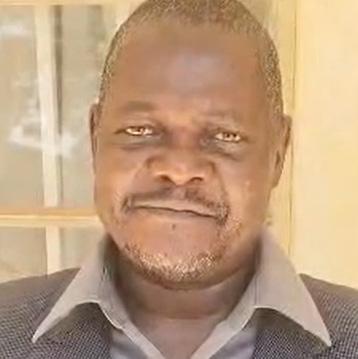
Without this ongoing support from individuals and international funding organisations, we would not be able to pursue our mission of addressing both the symptoms and the causes of parasitic disease and, eventually, ending it altogether.
To all those who have supported us over the year, named and not named above, thank you.
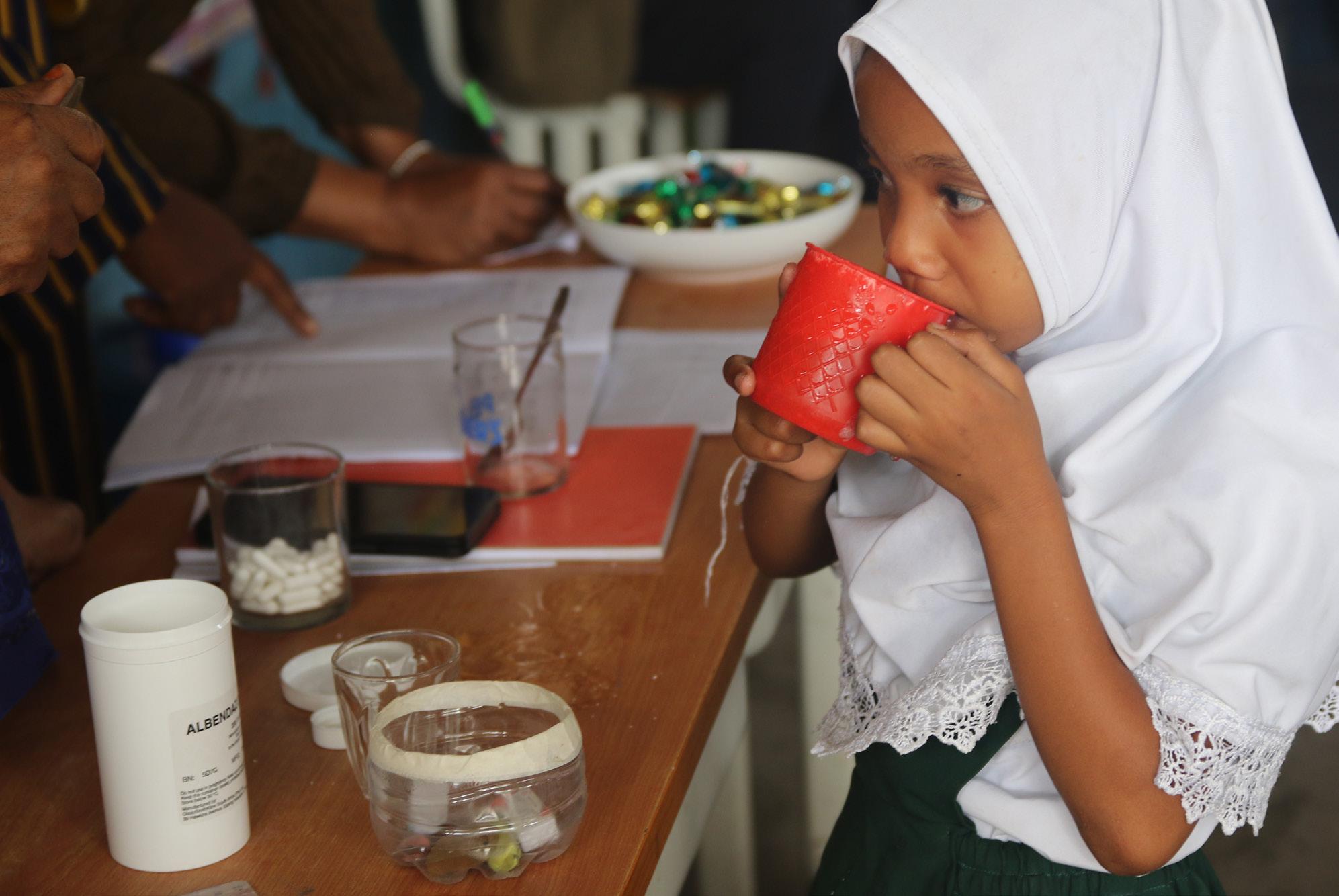
We have realised an operational deficit of £2.01m (2024, £3.84m, deficit), which was in line with our Operational Plan. This means that Unlimit Health held total funds of £12.11m (2024, £14.06m) at year-end. These funds are made up of restricted funds of £0.30m (2024, £0.21m), unrestricted general funds of £7.25m (2024, £8.03m), and designated funds of £4.55m (2024, £5.82m) which the trustees have earmarked, and we will draw down over the next two years to fund specific programme charitable activities as outlined in the plan.
We have received a total income of £6.80m (2024, £4.43m).
There was an increase of donations and legacies by £0.14m (2024, £0.83m, decrease). This was due to some one-off donations this year and suggests that we are overcoming the short-term negative effects of the rebrand on our visibility to prospective new donors. The investment income continued to perform well, although investment capital growth stagnated due to the new tariffs declared by the US government.
Unlimit Health spent £8.82m over the year (2024, £8.27m).
The financial year has ended with a strong balance sheet. At the year end, cash and cash equivalents were £6.63m (2024, £12.41m). Long- and short-term investments were £11.41m (2024, £11.34m). The total creditors balance at the end of the financial year was £6.37m (2024, £10.08m), and £5.98m (2024, £9.85m) of the creditors balance is deferred income. Of the deferred income, £3.22m (2024, £3.94m) is earmarked by the funders for expenditure in 2026/27 and beyond.




